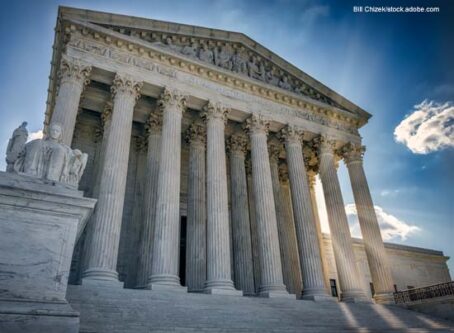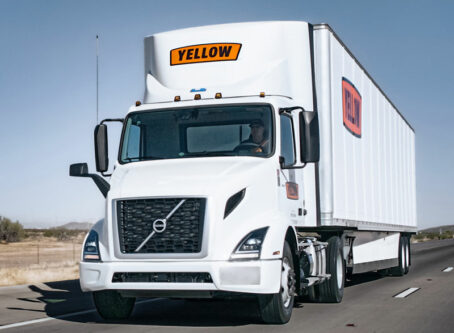Trump to California vehicle emissions regulators: ‘You’re fired!’
While professional truck drivers and others have long derided “The People’s Republic of California” for its heavy-handed environmental regulations, the Trump administration is using a constitutional argument to blunt the economic impact of the Golden State’s emissions rules.
By Friday, Sept. 20, the White House’s plan had sparked a war of words and eventually litigation as 23 states along with some local governments filed a lawsuit in federal court to stop Trump’s proposed change.
The Trump administration announced Sept. 19 that the U.S. DOT’s National Highway Traffic Safety Administration and the U.S. Environmental Protection Agency were implementing the final version of a proposed rule called Safer, Affordable, Fuel-Efficient (SAFE) Vehicles Rule by issuing a final action titled the “One National Program Rule.” The One National Program Rule is designed to enable a uniform national standard for fuel economy and greenhouse gas emissions for automobiles and light duty trucks.
Since the Nixon administration, California has been granted a waiver to enforce emissions rules stricter than national standards set by the EPA. Because auto and truck manufacturers don’t build vehicles specific to state standards, the California rules have become de facto national standards. While the waiver also enables heavy-duty diesel rules to be set by California, the denial of the waiver only explicitly mentions changes to regulation of car and light truck manufacturers.
“Today’s action meets President Trump’s commitment to establish uniform fuel economy standards for vehicles across the United States, ensuring that no state has the authority to opt out of the nation’s rules, and no state has the right to impose its policies on the rest of the country,” Secretary of Transportation Elaine Chao said, according to an EPA news release.
Trump issued his own comments on Twitter.
“The Trump administration is revoking California’s federal waiver on emissions in order to produce far less expensive cars for the consumer, while at the same time making the cars substantially SAFER,” the president tweeted.
“This will lead to more production because of this pricing and safety advantage, and also due to the fact that older, highly polluting cars, will be replaced by new, extremely environmentally friendly cars,” Trump added in a subsequent tweet. “There will be very little difference in emissions between the California standard and the new U.S. standard, but the cars will be far safer and much less expensive … Many more cars will be produced under the new and uniform standard, meaning significantly more JOBS, JOBS, JOBS! Automakers should seize this opportunity, because without this alternative to California you will be out of business.”
The Trump Administration is revoking California’s Federal Waiver on emissions in order to produce far less expensive cars for the consumer, while at the same time making the cars substantially SAFER. This will lead to more production because of this pricing and safety……
— Donald J. Trump (@realDonaldTrump) September 18, 2019
Trump has previously sought to roll back Obama-era emissions rules regulating methane emissions, air pollution and coal plants.
Environmental Protection Agency Administrator Andrew Wheeler said last week that California’s special status shouldn’t be interpreted as power over the rest of the nation. Wheeler cited the doctrine of federalism and its sharing of power between states and the federal government when criticizing California’s emissions rules.
“We embrace federalism and the role of the states, but federalism does not mean that one state can dictate standards for the nation,” Wheeler said. Later, in a discussion with NPR, Wheeler said federal agencies “are not supposed to go above and beyond and create our own laws – and under my administration here at EPA under President Trump, we are not going to create our own laws. We are going to follow the laws that Congress passed.”
American presidents have increasingly used executive authority to issue orders rather than relying on the legislative process designed by signers of the country’s constitution. Congressional leaders from the time of Ronald Reagan’s presidency have continued ceding legislative authority to federal agencies under the executive branch including the EPA.
The EPA also announced it is withdrawing the 2013 Clean Air Act waiver that authorized California to pursue its own tailpipe greenhouse gas emission standard and zero-emission vehicles mandates.
The EPA’s news release finished with a blistering critique of the state’s pollution issues.
“Moving forward, California must continue to enforce its programs to address smog and other forms of traditional air pollution caused by motor vehicles,” the release states. “The state must redouble its efforts to address the worse air quality in the United States and finally achieve compliance with EPA’s National Ambient Air Quality Standards, where for decades it has failed to address serious, severe and extreme noncompliance status in several areas within the state.”
On Friday, California and 22 other state and local governments, including the District of Columbia, filed suit against NHTSA. The complaint states the proposed rule “exceeds NHTSA’s authority, contravenes Congressional intent, and is arbitrary and capricious, and because NHTSA has failed to conduct the analysis required under the National Environmental Policy Act.”
The California Air Resources Board has been closely following Trump’s emissions actions. Last September, the board voted to continue its greenhouse gas emissions implementations for cars and light trucks regardless of changes made nationally.
“While we continue to work to keep a single national program, California will act to ensure strong standards are in place in California through 2025 and beyond to help us meet our climate targets and protect public health,” Nichols said in Sept. 2018. “Today’s vote by the board ensures that California and 12 other states will not fall victim to the Trump administration’s rollback of vehicle standards should its proposal be finalized.”
California Attorney General Xavier Becerra demanded the Trump Administration’s emissions change be declared unlawful and repealed while adding sharp words of his own.
“Two courts have already upheld California’s emissions standards, rejecting the argument the Trump administration resurrects to justify its misguided preemption rule,” Becerra said in a statement Friday. “Yet, the administration insists on attacking the authority of California and other states to tackle air pollution and protect public health.”
Becerra added later that the Oval Office “is really not a place for on-the-job training. President Trump should have at least read the instruction manual he inherited when he assumed the presidency, in particular the chapter on respecting the rule of law. Mr. President, we’ll see you in court.”
Editor’s note: Charles Morasch is a former Land Line staff writer who left to pursue a career in law. He recently passed the Missouri bar. Congratulations, Charles.









